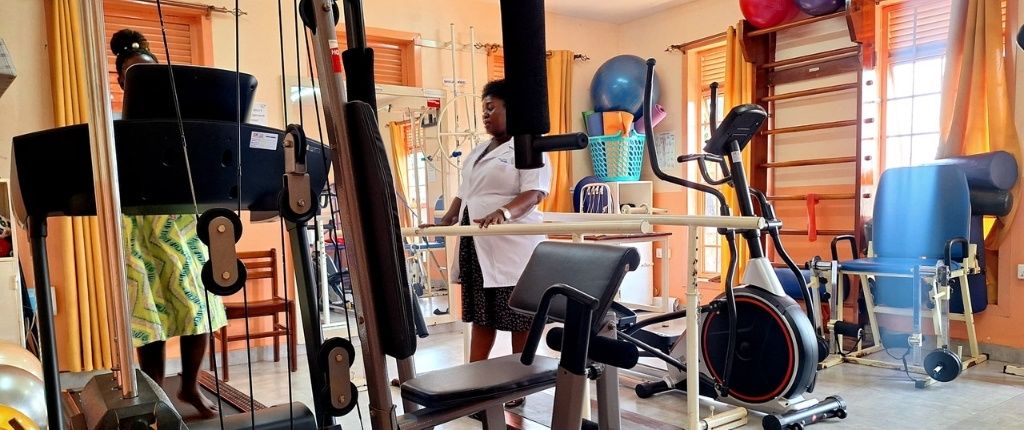
Strengthening the physiotherapy sector in Uganda
Over four million people in Uganda live with a disability. Often, illnesses during pregnancy go undetected, or there are complications during childbirth. In addition, there has been a significant increase in injuries caused by road accidents. Those affected often suffer the consequences for a lifetime: it is estimated that over 70 percent of people with disabilities in Uganda live in poverty.
In many cases, physiotherapy could help or provide relief, but the availability of physiotherapists in Uganda is not sufficient.
For this reason, Malteser International is committed to sustainably strengthening the physiotherapy sector in Uganda. To this end, we are working with Lubaga and Nsambya Hospitals in Kampala as well as with the Uganda Association of Physiotherapy (UAP). Our goal is to improve access to high-quality physiotherapy services, enhance patients’ quality of life, shorten the course of illness, and reduce healthcare costs.
In Uganda, there are currently an estimated eight physiotherapists for every one million inhabitants. This extremely low number is mainly due to the limited enrollment in physiotherapy education programs. Only a few new physiotherapists graduate each year. Teaching methods are outdated, and training conditions are poor. Trainees often lack access to equipment and educational materials necessary for learning according to modern standards. Nationwide, there are very few qualified physiotherapists who are authorized to teach.
Moreover, physiotherapy is not a priority within the Ministry of Health, which means the sector’s full potential remains untapped. There is also a shortage of modern physiotherapy equipment and facilities, which limits treatment options. Patients have limited access to therapy services, and there is a particular lack of specialized therapies for certain medical conditions.
The situation is especially critical in rural areas: while hospitals in urban regions often have small physiotherapy departments, rural hospitals frequently have to share a single physiotherapist between multiple facilities. Additionally, physiotherapy is still relatively unknown among the general public, so many people do not fully understand the benefits of this form of therapy or know where to access such services.
-
Dissemination of the updated physiotherapy curriculum to all training institutions
-
Improvement of the physiotherapist-to-population ratio
-
Optimization of physiotherapy services through investments in infrastructure and equipment
-
Expansion of physiotherapy services through enhanced professional expertise and intensified activities
-
Increase in awareness and acceptance of physiotherapy among both the general population and medical professionals
-
Training of physiotherapy instructors/tutors in the implementation of the revised curriculum and modern teaching standards
-
Procurement of physiotherapy equipment for physiotherapy departments and renovation of the physiotherapy training units at Lubaga and Nsambya hospitals
-
Implementation of career counseling and promotion activities for physiotherapy at selected secondary schools and nursing colleges
-
Organization of continuing education programs for physiotherapists to familiarize them with the latest evidence-based practices and techniques
-
Execution of public awareness campaigns via television, radio, print media, and the internet to promote the health benefits of physiotherapy
-
Strengthening the capacity of the Uganda Association of Physiotherapy (UAP) to develop into a self-sustaining organization
Country info
Capital: Kampala
Area: 241,040 km²
Population: approx. 47.8 million
Project info
Duration: March 2025 - February 2028 (36 months)
Financing: Else Kröner-Fresenius-Stiftung
Partners: Lubaga Hospital und Ugandan Physiotherapy Association (UAP)








